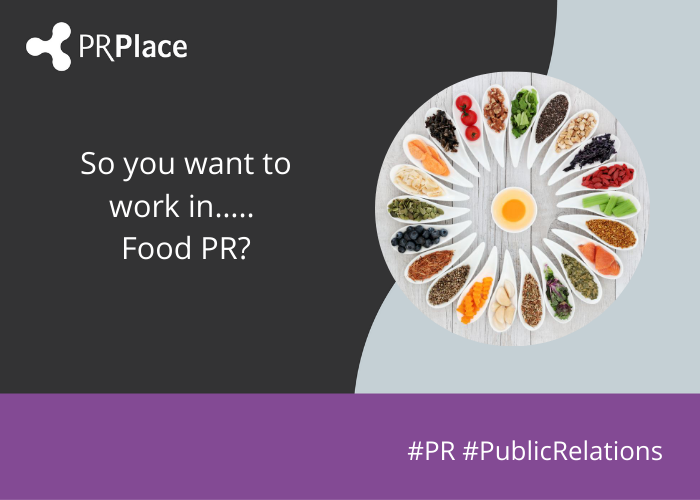So you want to work in… Food PR?

About the author
Maud started out as a consumer journalist with Good Housekeeping magazine and then moved into PR working with Hill and Knowlton, Nexus Communications, Richmond Towers and Slimming World. Now, she is a food PR consultant, specialising in media relations. FCIPR

What is food PR?
Food PR covers a variety of functions and this is reflected by the varied nature of the food industry and it tends to attract those interested in food, eating out, healthy diet and cooking.
It includes working for organisations and agencies that support the manufacture, sale and ownership of all kinds of food (everything from dairy, bakery and meat through to fruit and vegetables, drinks and cereals). It also includes working for restaurants, cafes and food service caterers as well as food industry bodies and charities.
A key part of food PR involves launching new foods/products where building relationships with specialist consumer and trade media and online influences is important.
Many educational and awareness-building food PR campaigns often focus on awareness weeks and topical calendar events, recipes, tastings and events. Food PR has strong links with healthcare PR because of the connection food has with diet and wellbeing hence other roles include public affairs and crisis management. And there are also roles in internal communication.
How do I get into food PR?
Many food organisations and PR agencies offer placement and graduate opportunities and there are growing opportunities for apprenticeships.
Another popular route is through food blogging, journalism (especially food/health and wellbeing) and cookery.
Or you might enter food PR through the corporate hospitality or events industry.
There is a lot of career movement within the industry. This includes moves from other functions and between brands, as well as recruitment from other related organisations or agencies.
If looking to make a career change, build a presence by engaging with PR practitioners and media.
Job opportunities are frequently shared by brands through LinkedIn and the vacancies sections of their websites.
Approach companies direct but research first so that you can engage with them on Twitter, LinkedIn and Instagram and then approach a specific person rather than send out a blanket email.
What’s the best thing about working in food PR?
Food is something everyone consumes and can relate to, so it has widespread appeal. Everyone can see, smell and taste food – so it is accessible for sampling and event-type PR activities which appeals to those who like getting out and about to meet people.
It’s highly visual and sensory so there are lots of opportunities for using written and visually creative skills – online and through traditional channels.
There is also an opportunity to consider the wider impact of food within the context of global and national food policy, environmental issues and farming, community health and changing consumer trends
All of these different aspects mean that there are plenty of opportunities for career development.
Are there any drawbacks to working in food PR?
The industry is very dynamic which can be a positive but there are so many external influences that affect consumer trends, policy and even the weather and this can put a pressure on PR plans and budgets, so one drawback can be the constant change.
Food PR is also quite a desirable sector to work in, yet it requires quite a broad skill set and competition for places at entry level can be high, so you have to show that you have a passion for food.
What’s the difference between doing it in house or in an agency?
In-house work is focused on planning and delivering organisational objectives, building stakeholder and government relationships and managing issues. Teams and individuals work closely with colleagues across organisations, as well as senior management. In most cases, there will be head office functions who co-ordinate and support the PR and communications activities.
Agencies working within the food PR are quite diverse and can range from global agencies who offer a range of services to specialist ‘boutique’ agencies. Larger agencies tend to offer corporate, public affairs, financial PR, crisis and marcomms servicesto a range of clients. Smaller agencies tend to specialise by sector eg restaurant, drinks, household brand or agriculture and they tend to offer both consumer and trade PR. Others offer expertise in a particular communication discipline (eg integrated marketing or corporate communications). Agency work tends to have an increased focus on digital and social media services.
There are also many freelance and independent practitioners working in the industry, who provide additional support and expert services.
Is food PR right for me?
This is what Jennifer John, director Ceres PR – a food PR and marketing agency says:
“You don’t need to be an expert in food, or to be a brilliant cook, but you do need a genuine interest in food and be prepared to invest in growing your knowledge. Food PR is about as diverse as it gets in this industry – from working on luxury brands to generic campaigns to health and wellbeing, you can cover all of that in a day! From media outreach to social and experiential, food PR offers the opportunity for an exciting career and the chance to specialise in the aspects and channels that interest you the most.
“Food is such a fascinating subject and one that is ever changing, which means that this is a really fast paced sector. You do need to take time to keep up to date with what is happening – including consumer and industry trends, environmental impacts on food production and consumption, nutrition knowledge and vitally – knowing who is who in food – from influencers to opinion formers.”
So, if you love food, hate being bored and enjoy always learning – then food PR could be the career for you!